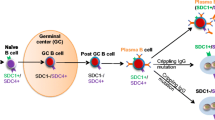Abstract.
Syndecans are heparan sulfate-bearing proteoglycans that are found on the surface of most cells. Syndecan-1 is expressed predominantly on epithelia, but is also present on pre-B cells and plasma cells. The syndecans act to bind various effector molecules via their heparan sulfate chains, including both soluble and insoluble molecules within the extracellular milieu. These interactions promote cell adhesion to extracellular matrix and to adjacent cells. In addition, the syndecans can bind to and affect the biological activity of a number of heparin-binding growth factors. Thus, syndecan-1 can play a dramatic role in regulating cell behavior. In this review we discuss the expression of syndecan-1 on malignant B lymphoid cells as well as specific structure-function relationships of the molecule. Emphasis is placed on the important role that syndecan-1 has in regulating the growth of B lymphoid malignancies, particularly multiple myeloma.
Similar content being viewed by others
Author information
Authors and Affiliations
Additional information
Electronic Publication
Rights and permissions
About this article
Cite this article
Sanderson, R., Børset, M. Syndecan-1 in B lymphoid malignancies. Ann Hematol 81, 125–135 (2002). https://doi.org/10.1007/s00277-002-0437-8
Received:
Accepted:
Published:
Issue Date:
DOI: https://doi.org/10.1007/s00277-002-0437-8




